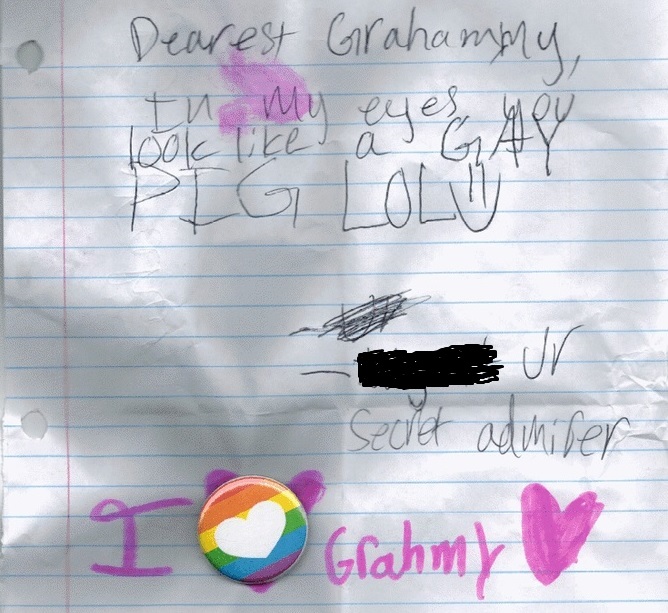A few weeks ago our fourth-grade son was called a gay pig. It happened in front of our home. The phrase was spoken by a student he knows from school. My wife and I talked with him about how cruel kids can sometimes be, how sad we were he was being bullied, brainstormed what he might say to the student when they saw each other next.
To be clear the word gay is not a slur. It is a demographic category, akin to describing age, gender, or race. But how it was being used here was intended to cause harm. And that got our attention.
He was called a gay pig again a couple weeks later, this time in writing, with letter placed on our porch, dropped off by the same person. When we saw our son anxiously walking past our windows peering out, worried the student might return, my wife and I knew there was more for us, as parents, to do.
We reached out to his school counselor, sharing our concerns, asking for guidance. The school counselor and principal met with us, listened, gave space to our son to share his story. They assured us school must be a safe place for all.
Most importantly, the school had a plan for what would come next. The parents of the child would be contacted. The student would be brought in for a talk.
The next day the school counselor arranged for our son and the student to meet. From that conversation there was honesty, confession, forgiveness requested, forgiveness received. The process, called a restorative circle is designed to –
Reconcile people,
Repair relationship,
Restore peace.
I can’t tell you how impressed I was with the process used, and the good that came from it. We love our Des Moines public schools.
Hearing about the goals of the restorative circle reminded me an awful lot of what we are called to be about here.
For without the mending of what has been broken, our son’s school community could not be made whole.
Crucial Conversations
For the past two Falls staff here at St. John’s have participated in a book study. Each week we review a chapter and discuss. The goal of these studies is always the same: to learn about ourselves, each other, to better form a team.
Last Fall we read Brene Brown’s business book, Dare to Lead. In it, the sociologist turned author coins a phrase: the stories we tell ourselves. When dealing with another person that rubs us the wrong way, it is human nature to mix facts with our interpretation of those facts. We then use this mixture to create a story about what we think is going on. That story is often untrue.
The fix, Brene suggests, is simple. Go to the other person. Say to them the story I’m telling myself about this conflict between us is this. You’ve done this horrible thing, and here’s why. Does that sound right to you? What might I be missing? Could you help me understand?
Checking the story you tell yourself helps clear up confusion. It makes it possible for people to get on the same page. Once done, healthy relationship can be restored.
This Fall our staff is reading a modern classic, Crucial Conversations: Tools For Talking When Stakes Are High. The authors suggest there are three ways to face crucial conversations when people disagree. We can –
Avoid them,
Face them, and handle them poorly,
Face them, and handle them well.
Said differently we can approach necessary conversations with:
Silence (that’s doing nothing),
Violence (that’s lashing out), or
Honesty.
You get one guess as to which approach works best 😊.
As our team works through the book together – we’re about halfway through – I’ve noticed something. Several times in the past few weeks I’ve heard something akin to this:
I was going to come tell you a problem I’ve been having with someone. But after reading the book I think I’ll go to them first. We need to have a crucial conversation.
Most often that takes care of it. The goal is always the same –
Reconcile people,
Repair relationship,
Restore peace.
Once done all is then well.
For as a staff without the mending of what has been broken, our sense of team would be incomplete.
Then
Long before school counselors and social psychology existed there were people. And whenever two or more gathered there existed the potential for good. And also the potential for conflict. Stories of both ebb and flow throughout our ancient texts. They are a common theme throughout.
Adam and Eve,
Cain and Abel,
Esau and Jacob
David and Saul, even
Jesus and Mary.
Each chose a different approach to dealing with their problems –
Run,
Kill,
Fume,
Battle,
Talk.
Jesus knew the importance of resolving differences. When Christ’s greatest commandment is to love your neighbor as yourself it almost goes without saying: maintaining healthy relationship is pretty much all we’re called to do. Today’s text from Matthew 18:15-20 to the early church offers wisdom on how to go about that well.
If another member of the church wrongs you, point it out to them. Do that one-on-one. Other translations use more familial language.
If a brother wrongs you,
If a sister wrongs you,
If a friend wrongs you –
Aka these are people with whom you are close.
We are to go to them.
We are to talk it out.
If they listen, great!
You have regained a friend.
The goal is always the same –
Reconcile people,
Repair relationship,
Restore peace.
When done consistently it yields a church community coexisting in harmony with itself. And with that, all is as it should be.
If the person doesn’t listen? Jesus lays out next steps.
Bring one or two others.
See if that does the trick.
If not ask for help from the church.
And if none of those things restore relationship, you have at least done your best.
This passage is often interpreted in punitive terms that ultimately exclude people. That understanding largely misses the intent. Biblical scholars disagree about whether Jesus said to treat anyone as a Gentile or a tax collector. That language is likely rhetoric from Matthew, writing to a Jewish audience to drive home a point.
Jesus’s record speaks for itself. Christ aimed for relationship with everyone, no matter who the person, be they Gentile, tax collector, prostitute. He ate, drank, spoke with, prayed with everyone. Jesus commands us to never give up on people, never to stop reaching out to them in love.
Peter, wanting to make sure he’s heard this right, then asks Jesus this question in the very next verse, Matthew 18:21. Lord, Peter asks, if my brother or sister sins against me, how often should I forgive? Seven times? No, Jesus replies. Seventy times seven. In other words, forgive the person as many times as it takes.
Close
When in conflict with another, may we heed the words of Christ.
We are to go to them.
We are to talk it out.
The goal is always the same –
Reconcile people,
Repair relationship,
Restore peace.
For it is only by mending what has been broken, and doing it –
again,
and again,
and again –
that our church, our families, our world can be redeemed. Amen.


